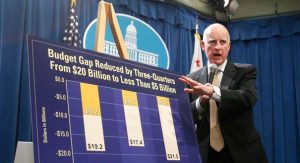New Budget: More To Fix
Sacramento, CA — The approved budget passed by California lawmakers, has made it through negotiations with Governor Jerry Brown. The terms of the approval call for two special sessions to address how California funds roads, highways and other infrastructure and the state’s core health program – Medi-Cal.
“This is a sound, well thought-out budget,” said Governor Brown. “Yet, the work never ends and in the coming months we’ll have to manage our resources with the utmost prudence and find more adequate funding for our roads and health care programs.”
The budget, passed Monday and supported by Democrats in the Senate and Assembly, would have allocated $117.5 billion during the fiscal year that starts July 1st. The negotiated budget is $15.4 billion.
Assembly Republican Leader Kristin Olsen says, “The Governor was wise to heed the call of legislative Republicans to base the state budget on realistic revenue projections and reject the Democrat spending spree.” Earlier statements from her are in the news story “New California State Budget?”
The budget agreement with Assembly Speaker Toni Atkins and Senate President pro Tempore Kevin de León, is called “consistent with prudent May Revision revenue estimates, that saves billions of dollars and pays down debt, while directing more resources to schools and low-income Californians.”
One of the two special sessions will be to address fixing California Roads, Highways and Other Infrastructure. Gov Brown says “current funding fails to adequately fund this necessary work. The state’s current fuel excise tax is sufficient to fund only $2.3 billion of work—leaving $5.7 billion in unfunded repairs each year.”
The Governor proposes that the Legislature enact permanent and sustainable funding to maintain and repair the state’s transportation and critical infrastructure, improve the state’s key trade corridors and complement local infrastructure efforts.
The other special session will address the financing of the state’s core health program – Medi-Cal. It will also address federal requirements for related to the Affordable Care Act. The current structure expires at the end of fiscal year 2015-16 and generates $1.1 billion. The Governor proposes that the Legislature enact permanent and sustainable funding to provide at least $1.1 billion annually to stabilize the state’s General Fund costs for Medi-Cal, sufficient funding to continue the restoration of the 7 percent of In-Home Supportive Services hours and funding for additional rate increases for providers of Medi-Cal and developmental disability services. The funding could come from the proposed MCO tax and/or alternative sources and is necessary to prevent over $1 billion in program cuts next year.
Olsen notes, “There is still much work to be done to get the majority party to stand with Californians on their top budget priority – water. We must work together to move storage, desalination and recycling projects that will increase water supply out of bureaucracy and into construction.”
Other Highlights from the Governor approved budget:
More Money for Schools: The agreement makes significant investments in schools – $14.3 billion for the K-12 system and community colleges, including $6 billion to continue to implement the Local Control Funding Formula which targets increased resources to students who face the greatest challenges.
Counteracting the Effects of Poverty: The agreement implements the first-ever California Earned Income Tax Credit ($380 million) to help the state’s poorest working families.
Paying Down Debt: The agreement pays down billions in debts, including completely paying off school deferrals ($1 billion) and debts owed to local governments since 2004 ($765 million). The agreement also completely retires $15 billion in Economic Recovery Bonds used to cover budget deficits as far back as 2002, as well as $3.8 billion in mandate debt owed to K-14 schools.
Saving for a Rainy Day: The agreement saves $1.9 billion in the state’s Rainy Day Fund as required by Proposition 2, bringing the balance to $3.5 billion.
The budget agreement maintains the fiscal framework of the May Revision, including the General Fund revenue forecast, overall spending levels, a $1.1 billion operating reserve, Proposition 2 debt payments and Rainy Day Fund deposits.
By redirecting spending and using identified savings, including a reform of the Middle Class Scholarship program and correcting an error in the estimate for Medi-Cal, the budget agreement can afford additional spending, including:
- $40 million to expand Medi-Cal to cover all low-income undocumented children effective May 1, 2016 ($132 million when fully implemented).
- $265 million to fund 7,000 additional preschool slots and 6,800 child care slots, plus a rate increase for all providers.
- $97 million over the January budget for the California State University to expand enrollment and focus on increased success.
- $226 million on a one-time basis to restore the 7 percent reduction in service hours for In-Home Supportive Services.
- $500 million (Proposition 98) for a one-time teacher effectiveness block grant.

